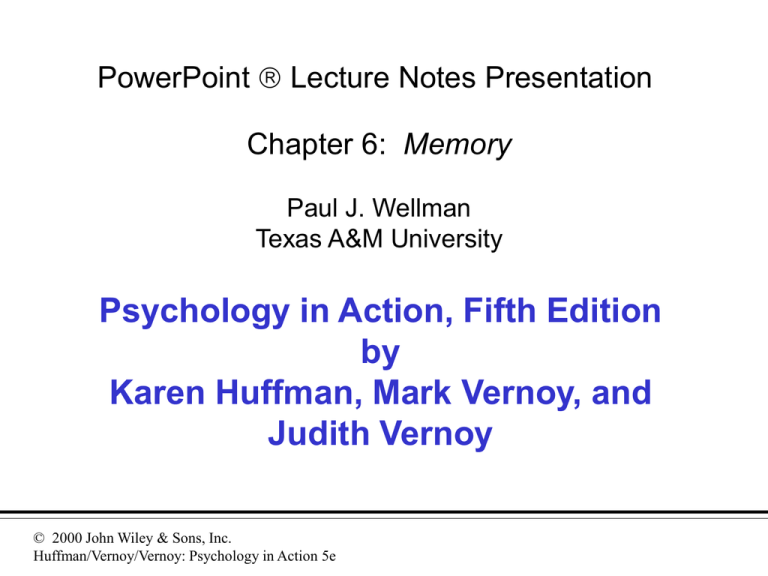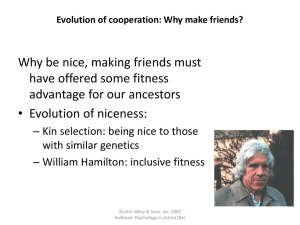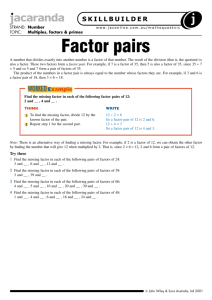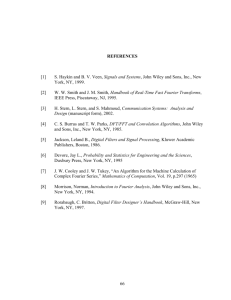
PowerPoint Lecture Notes Presentation
Chapter 6: Memory
Paul J. Wellman
Texas A&M University
Psychology in Action, Fifth Edition
by
Karen Huffman, Mark Vernoy, and
Judith Vernoy
© 2000 John Wiley & Sons, Inc.
Huffman/Vernoy/Vernoy: Psychology in Action 5e
Lecture Overview
•
•
•
•
Three-Stage Model of Memory
Forgetting and Memory
Biology of Memory
Memory Improvement
© 2000 John Wiley & Sons, Inc.
Huffman/Vernoy/Vernoy: Psychology in Action 5e
Memory
• Memory is the ability to code, store and
retrieve information
– Procedural: how to ride a bike
– Factual: definition of “learning”
• Memory involves coding the input of the
senses (visual, auditory)
• Memory is rarely perfect
– Forgetting refers to memory failure
© 2000 John Wiley & Sons, Inc.
Huffman/Vernoy/Vernoy: Psychology in Action 5e
Three Stage Memory Model
Rehearsal
© 2000 John Wiley & Sons, Inc.
Huffman/Vernoy/Vernoy: Psychology in Action 5e
Three Stages of Memory
• Sensory Memory is a brief representation
of a stimulus while being processed in the
sensory system
• Short-Term Memory (STM) is working
memory
– Limited capacity (7 items)
– Duration is about 30 seconds
• Long-Term Memory (LTM) is large
capacity and long duration
© 2000 John Wiley & Sons, Inc.
Huffman/Vernoy/Vernoy: Psychology in Action 5e
STM Forgetting Rate
• Without rehearsal
to maintain
memory,
information is
quickly lost from
STM
From Postman, L., & Phillips, L.W. / Short term temporal
changes in free recall. / Experimental Psychology Society / 1965
Reprinted with permission of the Experimental Psychology Society
© 2000 John Wiley & Sons, Inc.
Huffman/Vernoy/Vernoy: Psychology in Action 5e
Long-Term Memory
• Information transferred from STM to
LTM is coded into categories and stored
in terms of meaning
– REM sleep may play a key role in
categorizing new items in LTM
– Memories retrieved from LTM are not an
exact replica of the original event
– Memories are reconstructed and can be
altered during the retrieval process
© 2000 John Wiley & Sons, Inc.
Huffman/Vernoy/Vernoy: Psychology in Action 5e
Varieties of LTM
• Psychologists distinguish two types of
LTM
– Semantic memory refers to factual
information (What is the capital of Georgia?)
– Episodic memory refers to autobiographical
information as to where and when an event
happened
• “I remember visiting the capital of of Georgia”
© 2000 John Wiley & Sons, Inc.
Huffman/Vernoy/Vernoy: Psychology in Action 5e
Organization of LTM
From Collins, A.M., & Quillian, M.R. / Retrieval time from
semantic memory / Academic Press / 1969 / From A.M. Collins
and M.R. Quillian, Retrieval time from semantic memory, Journal of
Verbal Learning and Verbal Behavior Copyright © 1969 by Academic
Press, reprinted by permission of Academic Press and the author.
© 2000 John Wiley & Sons, Inc.
Huffman/Vernoy/Vernoy: Psychology in Action 5e
LTM Organization
• Items in LTM are organized in
categories that form a hierarchy with
multiple paths (direct and indirect) to
each item
– Sometimes the cues required to recall an
item are not sufficient
• Tip-of the tongue phenomenon: person can’t
easily recall the item, but shows some recall for
its characteristics (…it begins with the letter ….)
© 2000 John Wiley & Sons, Inc.
Huffman/Vernoy/Vernoy: Psychology in Action 5e
Memory Measures
Recognition is when a specific cue (face
or name) is matched against LTM
Recall is when a general cue is used to
search memory
– E.g. define the term “statistical significance”
Relearning refers to a situation in which a
person learns material a second time.
Memory is evident in savings of time to
relearn the second time versus the first
© 2000 John Wiley & Sons, Inc.
Huffman/Vernoy/Vernoy: Psychology in Action 5e
Flashbulb Memories
• Where were you
when you first
heard of the
death of Princess
Diana?
http://www.geocities.com/Heartland/
Meadows/5929/index2a.html
© 2000 John Wiley & Sons, Inc.
Huffman/Vernoy/Vernoy: Psychology in Action 5e
Forgetting
• Forgetting refers to
the inability to recall
previously learned
information
– Forgetting can be
rapid as evident in
Ebbinghaus’
experiment
© 2000 John Wiley & Sons, Inc.
Huffman/Vernoy/Vernoy: Psychology in Action 5e
Serial Position Curve
Recall immediately
after learning
Recall several hours
after learning
LTM
LTM
STM
© 2000 John Wiley & Sons, Inc.
Huffman/Vernoy/Vernoy: Psychology in Action 5e
From Murdoch, B.B., Jr. / The serial effect of free recall /
American Psychological Association / 1962 / Murdoch, B.B., Jr. (1962)
The serial effect of free recall, Journal of Experimental Psychology,
64(5), 482-488, figure 1, page 483.
Study Strategies
• Distributed practice
refers to spacing
learning periods in
contrast to massed
practice in which
learning is “crammed”
into a single session
• Distributed practice
leads to better retention
© 2000 John Wiley & Sons, Inc.
Huffman/Vernoy/Vernoy: Psychology in Action 5e
From Peterson, L.R., & Peterson, M..J. / Short-term retention of
of individual verbal items / American Psychological Association
/ 1959 / Peterson, L.R., & Peterson, M..J. (1959) Short-term
retention of of individual verbal items, Journal of Experimental
Psychology, 8(3), 193-198. Copyright © 1959 by the American
Psychological Association. Reprinted/Adapted by permission of
the author.
Theories of Forgetting
Interference theory argues that information
competes for retrieval
– Proactive interference: old information
interferes with recall of new information
– Retroactive interference: new information
interferes with recall of old information
Decay theory: memory fades with time
Motivated forgetting:loss of painful
memories
Forgetting as retrieval failure
© 2000 John Wiley & Sons, Inc.
Huffman/Vernoy/Vernoy: Psychology in Action 5e
Amnesia
• Amnesia is forgetting produced by brain
injury or by trauma
– Retrograde amnesia refers to problems
with recall of information prior to a trauma
– Anterograde amnesia refers to problems
with recall of information after a trauma
Retrograde amnesia
Anterograde amnesia
Point of Trauma
© 2000 John Wiley & Sons, Inc.
Huffman/Vernoy/Vernoy: Psychology in Action 5e
Patient H.M.
• Patient H.M. suffered from chronic brain
seizures
– In the 1950’s, surgeons removed portions of his
hippocampus in order to reduce the seizures
– Patient H.M. shows chronic anterograde
amnesia
• He has normal STM
• He has normal recall for material learned prior to the
surgery
• Patient H.M. has learned very little since the surgery
© 2000 John Wiley & Sons, Inc.
Huffman/Vernoy/Vernoy: Psychology in Action 5e
Memory Strategies
• Mnemonic devices are strategies to
improve memory by organizing
information
– Method of Loci: ideas are associated with a
place or part of a building
– Peg-Word system: peg words are
associated with ideas (e.g. “one is a bun”)
– Word Associations: verbal associations
are created for items to be learned
© 2000 John Wiley & Sons, Inc.
Huffman/Vernoy/Vernoy: Psychology in Action 5e
Copyright
Copyright 2000 by John Wiley and Sons, New York, NY.
All rights reserved. No part of the material protected by
this copyright may be reproduced or utilized in any form
or by any means, electronic or mechanical, including
photocopying, recording, or by any information storage
and retrieval system, without written permission of the
copyright owner.
© 2000 John Wiley & Sons, Inc.
Huffman/Vernoy/Vernoy: Psychology in Action 5e








